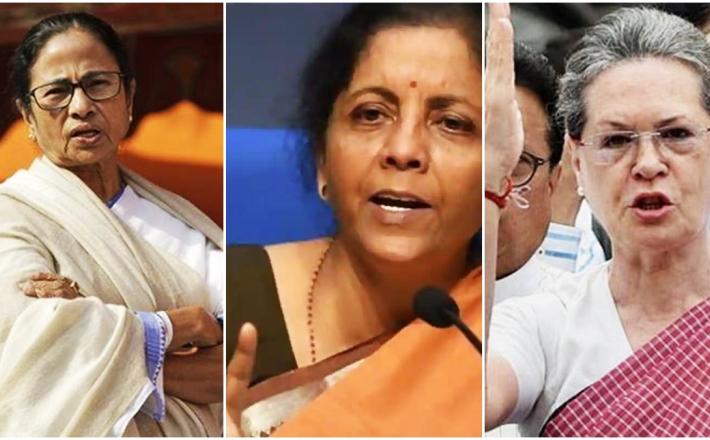Aunty, Didi, Bhabhi, Tai: How Indian women politicians are ‘domesticated’ so they fit in
Source: Feminism India
The Suffrage, one of the most important milestones for the feminist movement, marked the beginning of women’s struggle to win the right to vote. Generations later, not only do women exercise voting rights, they have also contested and won elections. Given how politics was seen as largely a patriarchal domain, this was a feat in itself. But the trend as we see is, the Indian political space has time and again attempted to ‘domesticate’ many women politicians, so they fit into the political and social narratives, on patriarchal terms. When finance minister Nirmala Sitharaman was introducing the Covid-19 relief package, a quick look through social media spaces showed how she was mockingly being referred to as “Nirmala tai”. And remember the notoriously sexist Telegraph headline that called Smriti Irani “Aunty-National”?
‘Taming’ the Indian Women Politicians
Kinship terminologies are often used for women politicians, shifting the focus on essentialising their many roles as a woman first. In another of his tireless rants recently, Arnab Goswami attacked Sonia Gandhi. Referring to her as “Italy waali Sonia”, he accused her of not speaking up against the Palghar lynching of two Hindu seers and their driver. Soon after, the hashtags #BarDancerSonia and #RaGaKMKB began trending on Twitter. While one implied Gandhi’s apparent past profession as a bar dancer, the second was a violent, sexist abuse for ‘Rahul Gandhi’s mother’. More popular monikers for Gandhi are “videshi bahu” and “swadeshi beti” – both repeatedly evoking her identity of a daughter-in-law.
The argument here is that the arena of politics and public affairs have exclusively remained a patriarchal domain for decades, with no significant change even after the suffrage movement. In India, we continue to fight for 33 per cent reservations for women leaders. In addition to denying reservations to women politicians, the hanful inside the circle are, in a manner, ‘tamed’ so they fit into the political space. Disagreeing with Smriti Irani, Nirmala Sitharaman or Sonia Gandhi’s policies and politics is one thing, but making misogynist references such as aunty and tai is just an attempt to otherise women politicians from the masculine political space.
Click here to read the full article published by Feminism India on 16 June 2020.

The Suffrage, one of the most important milestones for the feminist movement, marked the beginning of women’s struggle to win the right to vote. Generations later, not only do women exercise voting rights, they have also contested and won elections. Given how politics was seen as largely a patriarchal domain, this was a feat in itself. But the trend as we see is, the Indian political space has time and again attempted to ‘domesticate’ many women politicians, so they fit into the political and social narratives, on patriarchal terms. When finance minister Nirmala Sitharaman was introducing the Covid-19 relief package, a quick look through social media spaces showed how she was mockingly being referred to as “Nirmala tai”. And remember the notoriously sexist Telegraph headline that called Smriti Irani “Aunty-National”?
‘Taming’ the Indian Women Politicians
Kinship terminologies are often used for women politicians, shifting the focus on essentialising their many roles as a woman first. In another of his tireless rants recently, Arnab Goswami attacked Sonia Gandhi. Referring to her as “Italy waali Sonia”, he accused her of not speaking up against the Palghar lynching of two Hindu seers and their driver. Soon after, the hashtags #BarDancerSonia and #RaGaKMKB began trending on Twitter. While one implied Gandhi’s apparent past profession as a bar dancer, the second was a violent, sexist abuse for ‘Rahul Gandhi’s mother’. More popular monikers for Gandhi are “videshi bahu” and “swadeshi beti” – both repeatedly evoking her identity of a daughter-in-law.
The argument here is that the arena of politics and public affairs have exclusively remained a patriarchal domain for decades, with no significant change even after the suffrage movement. In India, we continue to fight for 33 per cent reservations for women leaders. In addition to denying reservations to women politicians, the hanful inside the circle are, in a manner, ‘tamed’ so they fit into the political space. Disagreeing with Smriti Irani, Nirmala Sitharaman or Sonia Gandhi’s policies and politics is one thing, but making misogynist references such as aunty and tai is just an attempt to otherise women politicians from the masculine political space.
Click here to read the full article published by Feminism India on 16 June 2020.